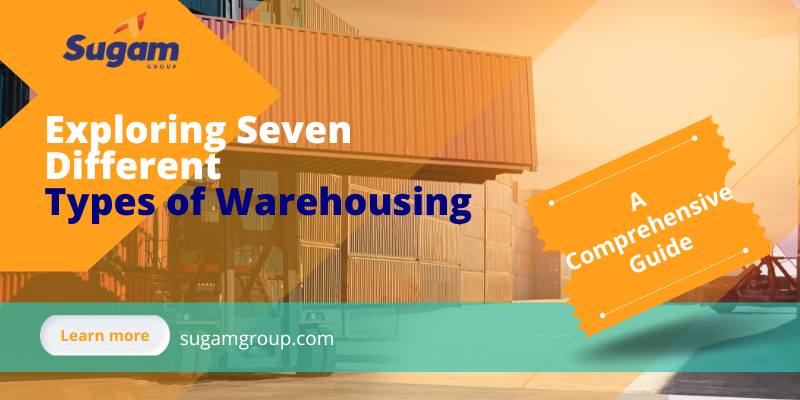Exploring Seven Different Types of Warehousing
In today’s fast-paced and interconnected business landscape, efficient supply chain management is a key determinant of success. At the heart of this management process lies the concept of warehousing. Warehouses are no longer just dim, cold, and dusty spaces filled with stacks of crates; they have evolved into dynamic, high-tech hubs of activity. The Sugam Group recognizes the pivotal role that warehousing plays in modern business operations, and in this comprehensive guide, we delve into the different types of warehouses and their significance in contemporary supply chain management.
The Evolution of Warehousing
Warehouses, in their essence, are large storage facilities that house raw materials or finished products until they are ready for distribution and sale. However, not all warehouses are created equal. Their size, features, technological capabilities, and locations vary significantly, catering to diverse business needs. The choice of warehouse type can profoundly impact a company’s order fulfilment operations, customer relations, and overall success. Timely and efficient order processing during peak seasons, like holidays, becomes particularly crucial. Therefore, making an informed decision about the type of warehouse to utilise is paramount.
Exploring the Seven Major Types of Warehouses
1. Distribution Centre
Distribution centres are the giants of the warehousing management world. They boast extensive storage space and are strategically designed to facilitate the rapid movement of large quantities of goods. These centres are essential elements of the supply chain as they ensure the swift and reliable distribution of products. Often equipped with advanced computerised control systems, they achieve high operational efficiency. Distribution centres are typically located in proximity to transportation hubs to further expedite deliveries.
Why Choose a Distribution Center?
- Operational efficiency.
- Ample storage capacity.
Also Read:- Role Of The Warehouse In Pharmaceuticals Manufacturing
2. Public Warehouse
Public warehouses are owned by government or semi-government bodies and are made available to private sector companies for rent. They are a cost-effective option, especially for small businesses and eCommerce startups that may not be ready to invest in their warehouse facilities. Public warehouses provide essential storage space, allowing businesses to handle excess inventory until they are ready to establish their warehousing infrastructure.
Why Choose a Public Warehouse?
- Affordability.
- Accessibility.
3. Private Warehouse
Private warehouses are exclusively owned by large retail corporations, wholesalers, manufacturers, or distributors. Even major online marketplaces maintain private warehouses to store merchandise. These facilities are used for storing bulk quantities of products, often acquired in preparation for peak demand periods. While establishing a private warehouse demands significant initial capital investment, it can prove cost-effective for well-established companies over time.
Why Choose a Private Warehouse?
- Greater control over operations.
- Enhanced regional presence.
Also Read:- Freight Shipping And Cargo Shipping
4. Bonded Warehouse
Bonded warehouses are primarily owned and operated by government or private agencies. These warehouses serve a unique purpose: they store imported goods before customs duties are imposed. Importers can keep their items duty-free until the goods are officially released. Bonded warehouses are crucial for international trade and eCommerce businesses engaged in cross-border transactions.
Why Choose a Bonded Warehouse?
- Lower overall costs.
- Support for international trade.
5. Climate-Controlled Warehouse
Climate-controlled warehouses are designed to maintain specific temperature and humidity levels, making them suitable for storing items that require such controlled environments, especially perishables. These warehouses range from humidity-controlled spaces for fresh produce to freezers for frozen foods, ensuring the preservation of product quality and safety.
Why Choose a Climate-Controlled Warehouse?
- Protection against environmental factors.
- Enhanced inventory security.
6. Smart Warehouse
In the era of automation, warehouses are not far behind. Smart warehouses leverage artificial intelligence (AI) and automation throughout their operations, from packing to transportation. These high-tech facilities require minimal manual intervention and are increasingly adopted by eCommerce giants like Amazon and Alibaba. The automation reduces the chances of errors and lowers operational costs.
Why Choose a Smart Warehouse?
- Reduced chances of errors.
- Lower manual labour costs.
7. Consolidated Warehouse
Consolidated warehouses, operated by third-party logistics providers, serve as collection points for various small shipments from multiple suppliers. These shipments are then combined into larger, more economical truckloads destined for similar geographical locations. This approach is particularly advantageous for startups and small businesses with limited inventory.
Why Choose a Consolidated Warehouse?
- Economies of scale.
- No need for significant capital investment.
Making the Right Warehouse Choice
Selecting the appropriate type of warehouse for your business involves considering several factors, including your industry, specific business requirements, and budget constraints. Each warehouse type offers distinct advantages, and the right choice can significantly impact your operational efficiency and customer satisfaction.
During peak seasons, such as holiday rushes, the importance of efficient warehousing becomes even more pronounced. Timely order fulfilment can be the key to customer satisfaction and repeat business. Therefore, it’s crucial to carefully analyse your unique needs and leverage the diverse warehousing options available to your advantage.
The Sugam Group’s Commitment to Efficient Warehousing
At the Sugam Group, we understand the critical role that warehousing plays in modern supply chain management. Our commitment to excellence extends to every aspect of our operations, including warehousing. We tailor our warehousing solutions to meet the specific needs of your business, ensuring that your products are stored, managed, and delivered efficiently.
Whether you require a distribution centre for rapid product movement, a climate-controlled facility for delicate goods, or a smart warehouse for streamlined automation, the Sugam Group has you covered. Our diverse range of warehouse types and advanced technology ensures that your supply chain operates seamlessly, even during peak demand periods.
In conclusion, warehousing has evolved far beyond traditional perceptions. Today, it’s a critical component of successful supply chain management , offering a variety of warehouse types to suit the unique needs of businesses across industries. By making the right choice and partnering with experts like the Sugam Group, you can optimise your warehousing operations and achieve exceptional results in the competitive business landscape of the 21st century.




No Comments